Why does a newborn baby groan?
When the baby begins to grunt or arch in displeasure, it is necessary to establish the reason why he is experiencing discomfort.
It could be:
- Accumulation of gases in the intestines
- Regurgitation of air trapped in the stomach during feeding
- Urges to perform natural functions
- Overheating or hypothermia
- Uncomfortable position
- Wet or chafing diapers
Why does the baby groan?
- Occasionally, groaning can be caused by reasons that are neuralgic in nature. It would not be superfluous to consult a neurologist.
- Also, the baby may simply be uncomfortable lying down , something is in the way, or the baby just wants attention.
- And a newborn baby often grunts during feeding - after all, this is real work for them, responsible and intense.
Why does a newborn baby arch or stretch?
- Along with groaning, a newborn baby can also make various movements - stretching or arching the body. This is how the baby instinctively tries to relax the bladder when he wants to go to the toilet.
- In the same way, infants are able to relax their muscles to get rid of gases that collect in the intestines. And since the formation of all vital systems of the child’s body (including the genitourinary and digestive) is only in the process of formation, the baby has to make significant efforts. It is he who accompanies them with both sounds and body writhing.
- But babies who are bottle-fed sometimes arch and groan due to an unsuitable nipple . If it is inconvenient for the baby, and the child essentially cannot eat normally, then he will make just such movements, trying to “adapt” and find a position that is comfortable for him. In addition, the baby may arch his body if he was fed just before bed.
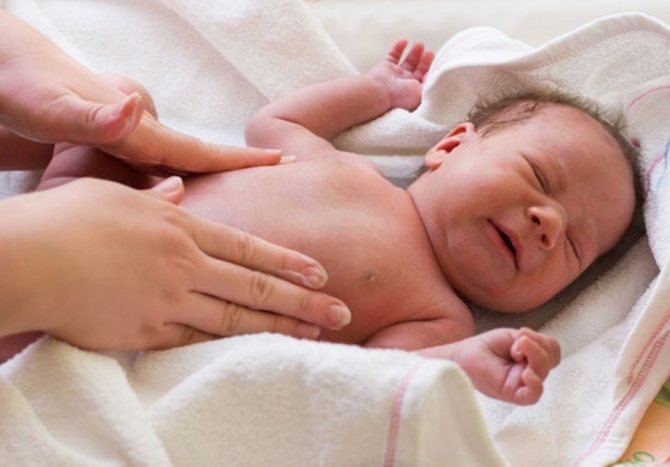
Stretch
The child constantly grunts and strains: alarming signs
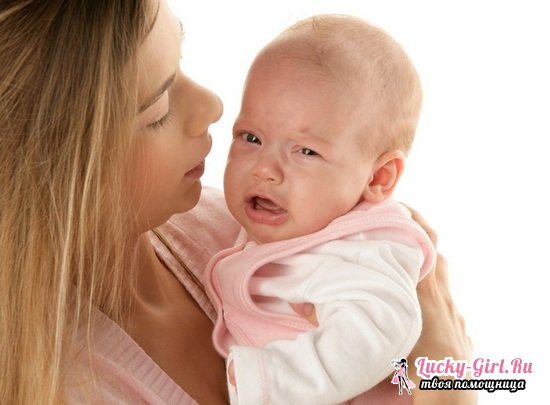
One of the alarming signs when a child strains and groans is the appearance of crying. If you have these symptoms, you should consult your doctor. Ideally, it does not hurt to consult with a specialist in case of any doubts or suspicions that arise in the parents. It is the doctor who can adequately assess why the little one is acting restless, groaning or straining.
The reason for contacting a doctor will be such symptoms as the child’s restlessness, refusal to eat, or in a situation where the baby actively eats all night but sleeps poorly. Consultation with a specialist is necessary in case of true constipation - the absence of stool for several days, when during the act of defecation the child writhes strongly, cries and the consistency of the stool does not correspond to the age norm.
You should not postpone consultation with a pediatrician if groaning is combined with frequent regurgitation, vomiting, weight loss, severe anxiety in the baby, or, conversely, apathy.
No matter how strange the child’s behavior may seem, you should not panic, but you just need to figure out what preceded this moment. The pronunciation of any sounds by a baby does not always indicate pathology. Even the baby's crying can indicate that the child just wants to feel his mother nearby. Receive a portion of care, love and understanding that he was not abandoned!
When an image of a baby is placed in magazines, on postcards, billboards or anywhere else, it is always a calm and peaceful creature. This is exactly the association that most of us have with the image of a newborn baby - cute, sleeping, smiling, charming! And only mothers know that in reality the picture does not always look like this. Very often, newborns cry, scream, grimace, and also behave completely incomprehensibly for many and even frightening for some parents. For example, they push, and at the same time they grunt, blush, growl or cry.
When a newborn baby strains, every mother has a response desire: to help him with something. But with what? And, in fact, what to help from?
Let's talk today about why a newborn is pushing and what to do in such cases.
Newborn baby strains and groans
If your baby is pushing, he is one of the vast majority of normal babies. Children in the first few weeks and months are characterized by this behavior, and it does not portend any disorders, deviations or health problems.
Doctors cannot name the exact reason why a newborn is pushing; more precisely, there may actually be several reasons, and there are also just versions. But if the baby doesn’t express other signs of anxiety, then don’t let the child’s straining scare you. Moreover, it is very often accompanied by grunting or groaning, which can also be an absolute norm. Pediatricians say that a newborn can normally push and groan without any harm or danger until solid food appears in his diet, so don’t worry.
Since the baby does not know how to express himself in any other way except with the help of his voice, and a little later with facial expressions, some kind of grunting along with straining may be one of the variations of the infant “language”. At the same time, it is not at all necessary that such behavior has a negative connotation (experts believe that this is how babies can express any of their emotions), but still more often in this way (some mothers say that the baby growls and gets angry) the baby expresses his dissatisfaction: he is hungry, wet, hot, bored, and so on. By the way, this may be one of the reasons why the baby strains and groans when feeding: the milk flows poorly or is not there, it has a “not the same” taste, or there is a problem with the baby’s gastrointestinal tract, which will be discussed below.
Newborn baby pushing while feeding
Another feature of the fact that the child is pushing under the breast or while feeding from a bottle may be the processes of natural bowel movement. Most children relieve themselves just under their mother's boobs: at this moment they relax completely, the tone in the intestines disappears, which is why spontaneous bowel movements occur. But sometimes you still have to make an effort: almost any mother will understand that the child is pooping or peeing at this time.
Newborn baby strains and blushes
In general, doctors believe that the urge to defecate (and even urinate) in newborns can normally very often be accompanied by groaning and straining, and on top of that the child may also blush. Redness of the skin (primarily the face) is caused by the physical efforts exerted by the baby when straining. And he strains when he wants to go to the toilet, for a completely harmless reason: the immaturity of the processes responsible for defecation.
Thus, the sphincter of the rectum of a newborn is not yet able to contract properly to help with bowel movements; the abdominal muscles are not yet developed and are not able to contract, moving the contents of the intestine; the baby's stool is very soft and does not put proper pressure on the anus; on top of that, the baby cannot “rely” even on gravity, because he relieves himself in a horizontal position, which does not make the task any easier.
So, if a newborn baby strains and blushes while trying to poop, this does not mean that he cannot do it or is having difficulty. He just helps himself as best he can. Meanwhile, constipation in a newborn is not at all excluded; moreover, this problem is quite common today.
Newborn baby strains and does not poop
Constipation in a newborn is a complex and controversial topic. There is no consensus among different doctors about what can be considered real constipation in an infant, and discussions around this issue continue very actively. And yet, if a child strains and does not poop, then the likelihood of developing constipation is very high.
Let's say right away that breast-fed babies almost never experience constipation if the mother eats properly, does not overuse foods that hold the stool together, and drinks enough water. This problem is more characteristic of “artificial” people, but for both of them, constipation in reality may not be such.
Firstly, the newborn’s intestines work in test mode for a certain period, experiencing different patterns of bowel movements: frequent and infrequent. Therefore, “constipation” and “diarrhea” of infants are often transient, training in nature, are not health problems, and do not require any intervention from parents and doctors.
Secondly, we can talk about real constipation when the child’s stool is very hard and dry, resembles pebbles or goat feces, and passes painfully.
If the child strains and does not poop, but the stool, as expected, is soft and mushy (this only happens quite rarely), then there is “hunger constipation” - a condition in which the baby does not defecate because there is simply nothing to eat. In this case, stool retention is accompanied by a decrease in the child’s body weight.
Constipation in a child should definitely be treated. The pediatrician will give the necessary recommendations, but medications, even the most “healthy, harmless and natural” ones, should be used last, when other methods of treating constipation in children have been tried.
By the way, many mothers note the same reaction of their children to the administration of vitamin D: soon after the start of the course, the child strains and groans, often in his sleep, and may even stop defecating regularly. Therefore, it is worth analyzing not only your diet, but also the “diet” of the baby.
In addition, straining can be caused by a number of disorders in the baby’s body, for example, infant colic.
Newborn baby pushing and crying, screaming
If a newborn is pushing and crying, and especially if he is screaming and clearly suffering from discomfort and pain, then there is no need to say that this is normal and typical for most babies. However, this happens quite often, but in this case the reasons need to be sought and eliminated.
For babies in the first weeks and months of life, colic is most common. In response to abdominal pain, the child not only begins to cry, but also strains, and needs help. By the way, along with straining and colic, regurgitation often appears.
It is best to engage in prevention and direct your efforts to prevent the development of colic:
- Place the baby on the tummy as often as possible shortly before feeding;
- use various postures when carrying the baby in your arms, giving preference to those that apply light pressure to the tummy area;
- Regularly massage your newborn baby and do gymnastics (pulling the legs with bent knees towards the tummy is especially useful);
- learn how to properly attach your baby to the breast, make sure that he completely grasps the nipple and part of the areola and does not swallow air during feeding;
- if you are feeding your baby from a bottle, then you also need to monitor its location so that the baby does not swallow air;
- immediately after feeding, for several minutes (until the baby burps air), you should carry the baby vertically - “in a column”;
- adjust your own menu if you are breastfeeding. Eliminate all gas-forming and stomach-digesting foods;
- for babies who are bottle-fed or mixed-fed, it is very important to find a suitable formula: there are often cases when the baby’s body reacts poorly to the adapted “milk”;
- You should not dress your baby too warmly or wrap him up, as overheating also causes colic.
All these recommendations will be relevant even if you are already faced with the problem of colic. But now some more tricks can help. This mainly concerns the use of local heat, that is, it is necessary to warm the baby’s tummy. To do this, you can lean his tummy against your own belly, cover the baby’s tummy with a warm scarf or a heated diaper, stroke the tummy with your palm, making movements along the esophagus, that is, clockwise (you will heat it and massage it at the same time). If the newborn is straining and crying, then you should carry him in your arms with his tummy down or put him in the fetal position, holding him close to you. Of course, mother’s breasts can calm an upset baby and will be the best medicine in any situation!
The pediatrician can advise parents on anti-colic medications for babies: Espumisan, Baby Calm, Bebinos and others, various rectal suppositories for children, or at least the simplest and safest remedies - dill water or fennel tea. Don't rush to resort to any of them, including the last ones. Try to alleviate the baby’s condition using the methods described above, and only if they do not work, go to the pharmacy. Please note that different drugs are effective for different children. But with a gas tube and enemas, be extremely careful and always consult more than one doctor before putting them into practice!
During attacks of colic, the child cries and squeals, screams languidly, beats his legs and presses them to his stomach. Colic almost always becomes active in the evening, at approximately the same hours, but there are times when the child pushes in his sleep.
Newborn baby pushing in his sleep
Special attention should not be paid to the fact that this happens in a dream. Because it usually doesn’t matter when exactly—during periods of wakefulness or sleep—the child pushes. For any of all the existing reasons, this can also happen in a dream. If the baby does not wake up (that is, he does not hurt anything, he does not cry, but only strains or moans), then most likely he is hot or hungry, perhaps experiencing some other discomfort, or simply decided to relieve himself. A common cause of children's "noises" during sleep is excessively dry air in the bedroom, which causes nasal mucus to dry out, forming crusts in the child's nose: maintain the humidity in the child's room at least 50%.
Or maybe the baby is dreaming about something?..
We wish that nothing interferes with your child’s sleep!
Especially for nashidetki.net - Margarita SOLOVIOVA
When a newborn baby groans and strains, parents become concerned about his condition. After all, any sound made by a baby is immediately considered a sign of health or illness of the baby.
Why does a newborn baby turn red when he grunts?
- The face of a newborn baby turning red when grunting should not bother the mother much - the cheeks turn red from the effort, because for any movement and even to make a sound the baby requires a considerable amount of effort.
- So redness during normal groaning is the most common occurrence. Another thing is when redness of the face occurs against the background of general lethargy and prolonged whining or even crying. This combination may indicate persistent intestinal colic, so it would be correct to consult a pediatrician.
- It also happens that the child blushes and strains immediately when he is full. This is explained by possible muscle relaxation, which occurs as a reaction to the pleasure received from food, and the baby’s muscles are still very weak, so the processes of saturation and emptying in infants often occur in parallel.
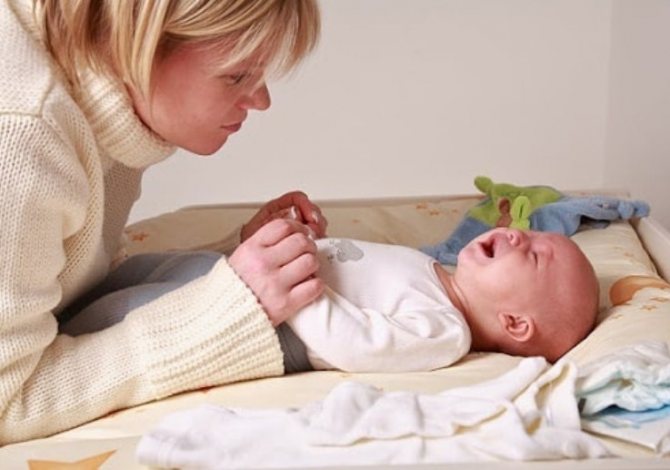
Why does the baby turn red?
What to do when a newborn baby groans?
First of all, mom doesn’t need to create a tragedy out of this. Groaning in a newborn baby is common, so you just need to figure out what exactly is causing it.
Having determined what is causing your baby’s anxiety, you need to do the following:
- If your baby begins to grunt before a bowel movement, help him by massaging his tummy clockwise . In this way, you will reduce the unpleasant pain experienced by the baby and facilitate the faster release of gases, followed by feces. A child may be bothered by colic, constipation, or bloating - this is how his stomach and intestines adapt to the external environment and new conditions. In addition, such regular tummy massage helps in strengthening the abdominal muscles. Light exercises will also help: bending and straightening your legs, raising your knees to your stomach.
- If the child begins to spit up after groaning , it is best to consult a specialist and experienced mothers. The problem may be that you are holding your baby incorrectly while breastfeeding and air has gotten into his stomach. Let your baby lie on his tummy a few minutes before eating. And in order to properly complete feeding, hold the baby for a minute or two in a vertical “ column ”. This will completely remove any remaining air from the stomach. Talk to your pediatrician about whether you can give your baby dill water and how much.
- When you find out that the baby is groaning for reasons other than the two described above, check his diaper, it may have become wet or chafing. Change the diaper and the baby will calm down. By changing the diaper, you will help the baby change his body position - it is possible that he groaned simply because it became uncomfortable for him to lie down. Also try his hands and nose to see if the baby is cold, pay attention to whether there is any perspiration from overheating.
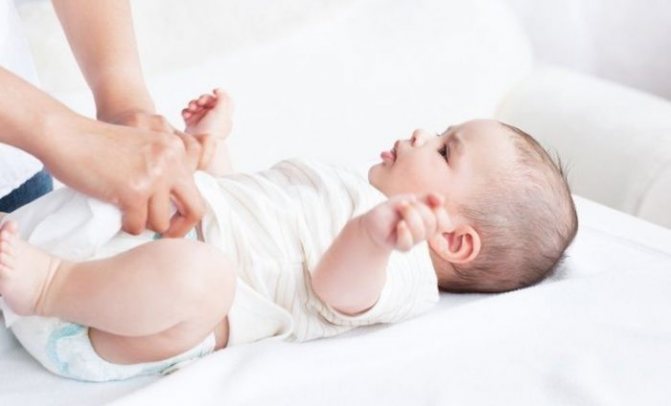
Check the diaper
Why do newborns groan? Reasons
Why do newborns groan?
There can be a great many reasons for this. We will talk about the most common causes of groaning. One of, perhaps, the most important reasons is tummy problems, namely: intestinal colic and bloating in children of the first year of life. The baby experiences a state of fullness in the stomach, as well as excessive gas formation, and all this occurs against the background of very painful spasms. Naturally, the baby will first grunt, then begin to push, then arch and eventually cry. He will try to attract your attention, because he doesn’t know how to speak yet. Often intestinal colic appears 10-15 minutes after feeding. You may even notice for yourself that the baby’s tummy is enlarging and becoming hard, and the newborn himself is beginning to worry more and more, twitching his legs, constantly straining and groaning, arching and crying.
Also, the reason a baby grunts is that he is trying to poop. After all, his tummy is full, now we need to empty it. The child cannot push properly, and therefore begins to groan. There is absolutely no need to immediately run to the pharmacy and buy some laxatives for your baby. Children are great at completing these tasks on their own, they just need a little more time. Of course, this doesn't apply when your baby hasn't pooped for several days. Normally, a newborn baby should poop at least twice a day.
Do you need to see a doctor and when?
There are certain symptoms that a mother simply must pay attention to and consult a doctor, namely:
the child does not eat; the child often vomits or spits up constantly and a lot; the child loses a lot of weight; the child is constantly tormented by colic, heartburn, belching; The child constantly has very loose stools. If your newborn baby constantly grunts in his sleep, sleeps restlessly, or even cries in his sleep, you should take your baby to the doctor.
Other causes of baby grunting
In fact, as you already understand, there can be a huge number of reasons for children groaning. A child may grunt, for example, if he is lying uncomfortably, so he shows you that he needs to be turned over, or, for example, his hat was tied too tightly and he does not like it, or he is simply hot, or maybe, on the contrary, cold, maybe his panties are wet - any kid doesn’t like that. It may even be that the child really likes it when his mother strokes his tummy, and he grunts on purpose to be stroked more.
What to do and how to help if a newborn baby constantly groans and strains?
If you are very concerned about your child's grunting, if he cries often, or if he has a hard tummy, then you need to consult a doctor. Don't be afraid to bother the doctor again. It is better to bother the doctor and ask what to do than for your child to suffer pain. A special exercise, the so-called bicycle, helps well; you slowly and carefully bend and unbend the baby’s legs and bring them to the tummy. You can stroke and massage your baby's tummy, this will relieve colic and relieve bloating. Even if you give your child more plain boiled water, or dill water, or fennel tea, this also greatly promotes intestinal function and relieves bloating and colic, and helps to better digest mother’s milk or formula if the child is bottle-fed. Another good way is to place the baby on his tummy 10 minutes before feeding, this will remove gas from the stomach, the food will be better absorbed and there will be no bloating afterwards. Has the child eaten? Do not put him in the crib right away, but hold him in a column for a few minutes. He will burp air, and he will not have any colic or gas. As you can see, there is nothing complicated or scary about a child groaning. The main thing is to understand the reasons for this groaning. Naturally, medicine is full of all sorts of different medicines that can come to the aid of a child and cope with colic, gas and other various misfortunes, but still, before giving any medicine to your baby, be sure to consult a doctor.
What to do if a newborn baby groans and sniffles?
- Simultaneously with groaning, a newborn baby may also make sniffles. Most often this means that for some reason it is difficult for him to breathe. The most common reason for this is the nasal passage not being cleared in time . If you do not do this regularly, a lump of mucus may accumulate and dry out in it, which will prevent the child from breathing freely.
- To help your baby, you need to clean his nose. It will also not hurt to moisturize the nasal passage with an age-appropriate preparation that contains sea salt. In addition, be sure to carry out daily wet cleaning in the room where the baby sleeps, and do not forget about the need for walks outside.

Clean your baby's nose
- The causes of sniffling or “grunting,” which, fortunately, are much less common, are congenital anomalies, possible curvature of the nasal septum, and the initial stages of rhinitis. In such cases, constant supervision by a pediatrician is necessary.
What to do if a newborn baby groans from an upset stomach?
- Diarrhea is a very dangerous condition for the baby, accompanied by groaning and arching of the body. It can be caused by various reasons, starting with the most serious - infections (intestinal or rotavirus). If the problem is infectious, the child’s body may even become dehydrated, so while waiting for the doctor, it is better to give the child plenty of water.
- If the doctor has ruled out pathology, the disorder may be related to nutrition. Perhaps, if the baby is artificial, the parents chose the wrong formula. There is no need to save on your own children; the formulas must be of high quality, with a normal shelf life, from reliable and well-established manufacturers.
If loose stools are accompanied by a “sour” smell, then it is quite possible that the newborn baby’s body does not produce enough lactase and the milk (lactose) is not completely absorbed. The doctor will prescribe a suitable lactose-free formula for your child.
- And finally, if a child has diarrhea, loose stools may simply act as an irritant to delicate skin. Therefore, the baby will grunt and bend over, trying to find the most comfortable position for him. Therefore, do not forget to thoroughly rinse your baby's bottom and wash him.
Why does a newborn groan and strain in his sleep?
While the little person is adapting to new living conditions, caring parents will have many reasons for concern. A newborn baby sometimes groans, sometimes sniffles, sometimes strains and tosses and turns in his sleep, sometimes cries, sometimes moans, sometimes the stool is the wrong color - yes, and with such complaints mothers turn to the pediatrician. And this is only the beginning of the epic of infantile characteristics.
In order to calm the most worried mothers and fathers at least a little, and help them overcome the first difficulties, we will talk about why a newborn groans and strains in his sleep, and how to help the child in this situation.
A newborn baby grunts and strains in his sleep: possible reasons
No mother can sleep peacefully when strange sounds are coming from the baby's crib. And these sounds can be very diverse: babies grunt, sniffle, moan, “quack” while tossing and turning or flexing their legs. Obviously, in this way they are trying to express their dissatisfaction and ask for help.
However, before panicking, calling an ambulance, or running to the pharmacy, parents should have at least a general idea of what may be causing this behavior. So, there are actually several reasons why a newborn groans and groans, tosses and turns, or strains in his sleep:
- Colic.
From about 3 weeks to 3 months (and sometimes up to a year), most often in the evening and at night, babies are bothered by their tummies. The cause of discomfort and restless behavior in this case is accumulated gases, which cause severe pain. As a rule, with colic, a newborn cries, makes various sounds in his sleep and draws in his legs. - Crusts in the nose.
The mucus that forms in the baby's small nasal passages due to insufficient hygiene, dry air and high ambient temperatures dries quickly. As a result, crusts form in the tiny nose, which impede the passage of air. Hence the strange sounds that frighten parents. - Constipation.
Normally, a breastfed baby has bowel movements at least twice a day; a bottle-fed baby has bowel movements less often. If the child does not have a bowel movement on time for any reason, the feces begin to put pressure on the thin walls of the intestines, causing pain. With constipation, a newborn may groan and strain in his sleep. - Neurological diseases.
Restless sleep in children older than 2-3 months may indicate problems with the nervous system; in this case, only a doctor can refute or confirm the assumption. - Other reasons.
It is known that infants are very sensitive to any irritating factors: tight clothing, high or low air temperature, thirst, untimely diaper changes - all this is a reason to loudly declare the problem. Very often, when children are hot, they begin to groan and toss and turn in their sleep, when they are cold, they hiccup, and when it is time to carry out hygiene procedures, they may cry. It is also possible that the reason for the strange sounds is a simple feeling of hunger.
What to do if a newborn groans, twists and strains in his sleep?
In order for the baby to sleep peacefully and the parents to have a little rest, it is necessary to eliminate the causes and factors contributing to the problem in a timely manner.
In the case of colic and constipation, it is important:
- a nursing mother should follow a diet;
- Before each feeding, place the baby on his tummy, and then keep him in an upright position for some time;
- Discuss with your doctor the possibility of taking special medications (for colic and constipation);
- periodically stroke your tummy and do exercises;
- correctly attach the baby to the breast, or select a pacifier;
- monitor the number of bowel movements (color and consistency are also important);
- if necessary, do an enema before bed (if the baby has not had a bowel movement for more than two days and is acting restless).
It is also necessary to regularly ventilate the room, clean the nasal passages, change diapers, and dress the baby only in high-quality clothes made from natural fabrics.
If a newborn cries, groans, or strains, and develops diarrhea, vomiting, skin rashes, or a fever, you should immediately consult a doctor.
What to do if a newborn baby groans from constipation?
- If the groaning is accompanied by a lack of stool (for infants the maximum is 3 days, for artificial babies - a day), the stool is hard and unformed, and the newborn child behaves restlessly, suddenly straining or straining, his face also suddenly turns red - all these symptoms indicate that that the newborn is constipated.

Baby may be constipated
- In such cases, you need to start by changing the mother’s diet, who should consume more fermented milk products. The child himself needs to be given more to drink and do not forget about the need for abdominal massage. If this set of measures does not produce an effect, the doctor should take on the further solution of the problem and, if necessary, select the necessary laxative. He will also tell you how long you can take the drug so that it does not become addictive.
Do I need to see a doctor if my newborn baby is groaning?
- It is best to be constantly in touch with your family pediatrician, especially in the first 3 months, which are the most important and responsible. The doctor should be informed about groaning, pushing, and other reactions of the child and changes in his behavior.
- It is easier for the doctor to determine what causes a particular reaction in the baby, and he can always advise not only remedies or exercises to alleviate the child’s condition, but also suggest how to eat properly for the mother, so that overcoming the difficult period of development and formation of the child’s body is comprehensive. If necessary, the doctor will discuss the diet , necessary and prohibited foods for a nursing mother.
- Usually, children's doctors themselves urge young parents not to panic if, up to 3 months, the child periodically groans, strains, and bends. As a rule, by the fourth month of a baby’s life, the work of all systems of his body begins to stabilize and become harmonious. Periodic telephone consultations with a local pediatrician are sufficient. But if a child begins not only to groan, but also often starts crying, then contacting a specialist is necessary.
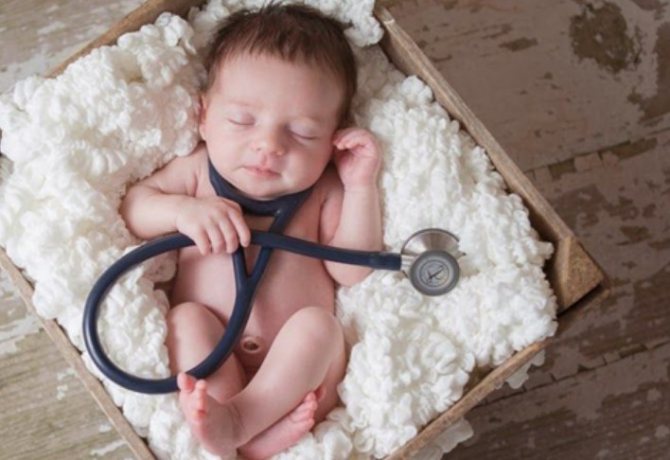
Groaning, straining, sniffling, blushing - all this is absolutely normal for a healthy child. You need to sound the alarm in the following cases:
- The baby begins to burp not immediately after eating, but after an hour or more, the regurgitated mass is significant (about a tablespoon);
- The baby defecates frequently and loosely;
- Blood is noticeable in the stool of a newborn baby;
- The child begins to turn away from food, although enough time has passed since the last meal;
- Poor weight gain;
- The child is often constipated for several days;
- The child becomes lethargic or, conversely, overexcited;
- A rash appears on the baby's body .
Fortunately, much more often babies grunt and bend over simply because they do not yet know how to make other sounds and perform other movements. Let this be the case with your little one!
Useful articles about children:
- Why doesn't the child listen?
- What to do if your child constantly lies
- The child is a bully - what to do
- Slow child-hoarder
- Newborn baby sneezes
baby groans in his sleep
We turned one month old on May 25th, but today we visited the doctor and so I decided to at least write something.
Where to start...Probably with today's trip to the doctor.
So, the weight is 4400, that is +850 g. from the initial weight. This is good))) Moreover, I was worried that Liza wouldn’t eat enough... There was something strange with her height, they measured 52 cm, taking into account that Liza was born 53 cm. It seems to me that something is wrong here, well, a child can’t not only not grow but and even become smaller... We got vaccinated and then the mother became stupid, so she thought that since they didn’t say anything and sent her for vaccination, there was no need to come back... But in theory they should give a referral to specialists every month... In short, we’ll have to find out tomorrow... Who was stupid , me or the nurse...
She doesn’t like to swim, she didn’t squeak only once... Apparently the stars were aligned that way...
I feed on demand, but it comes out after about 2.5 hours, if we go for walks it takes longer, and at night he can sleep for about 3-3.5 hours...
Speaking of sleep... She sleeps like an angel in our bed, in her own bed she often wakes up and cries... And another observation... I have a robe, you know, a soft terry one, now she sleeps well in it))) Probably because it’s very soft)))) I’ll turn around , I’ll feed with one breast for about 2 minutes and that’s it, we’ll continue to sleep….
About feeding... Everything seems OK, but in the evening he doesn’t eat enough.... He sucks and sucks and cries ((((We have to supplement with formula once a day(((
It’s been 4 days now that there’s been an incomprehensible rash on the pug, like it’s blistering, the doctor said “it’s blooming” and there’s no need to treat it... It goes away and then again... It seems to me that the milk gets in and the skin reacts like that...
There is no colic as such, sometimes he grunts in his sleep and goes back to sleep...
I wear it more often in a sling, while I’m taking the stroller down from the 5th floor... It’s a shame that when we moved, we lost the frame from Tyomych’s stroller, it’s so cool... I have to use another one, it was given away, it’s blue and uncomfortable... I’ve been looking for everything, maybe the frame is sold separately from someone, but it’s not (( (((((And just a question, maybe someone knows where such things are sold... Not on Avito((((It’s just a frame, there are wheels, two blocks - a cradle and a walk, a bag, etc.
With the sling, Lizka has also become hot now... We need to adapt somehow....
The children are used to Lizka, Tyomych sings songs, Ksyusha can calm her down very well))))) I think as soon as Liza sits down they will play great together))))
About myself: I’m returning to my usual weight, I like my figure, I just need to polish my abs and that’s it)))) But it’s kind of clumsy, my butt is small again, my breasts are big... Not standard, S - doesn’t fit in the chest (((( My hair doesn't come out at all, although with other children it was terrible...
I’m tired, but my husband helps me a lot, he says that he didn’t feel anything like this when the older ones were born... He’s grown up, apparently)))) He can calmly put him to sleep, rock him to sleep, take a walk, whatever I would do without him... And he entertains the older ones, I don’t have much time yet... Yes and no one canceled household chores...
I feel very bad morally, the fact is that on May 9 my parents passed away... Both of them, there was a fire in their house and... they were gone... My husband went and carried out the bodies... I still can’t come to my senses... It’s very bad morally... There were quarrels with my mother, and she didn’t even see Lisa... Dad came and talked to him that day literally a few hours before... Now I’m so afraid for my children, husband, grandmother, I’m afraid of losing them too... I can't come to terms...
In general, it’s like this, it’s difficult, it’s bad, but you need to move on with your life...











